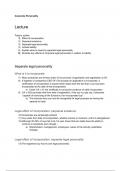Lecture notes
Company Law - Corporate Personality - Full lecture notes, textbook readings, further readings
- Module
- Institution
- Book
Corporate Personality - Weeks 3 - 4 - Company Law at Queen Mary University of London Part of a wider series of Revision Bibles, this note bible covers weeks 3-4. This includes lecture notes, textbook reading summaries, and additional / recommended reading which gave me a high 1st class in Compa...
[Show more]




